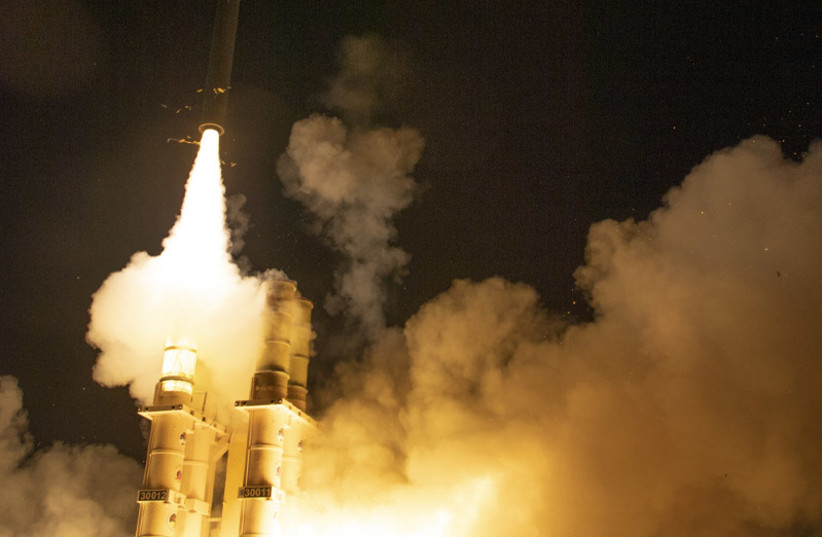With negative ratings and report after report coming in against Israel’s economic stability over the government’s judicial reform policy, there is one part of the economy that has defied the trend: the defense technology sector.
Even as Israel’s military, the Shin Bet (Israel Security Agency), and the Mossad are shaken to their foundations with a wide mix of senior and rank-and-file officials protesting the treatment of the legal establishment, and some even starting to quit their roles, Israel Aerospace Industries made history moving its deal forward with Germany for the Arrow 3 missile system.
And that deal is not an outlier.
In fact, since Russia invaded Ukraine in February 2022, Europe and some other countries have become much more serious about spending money on their national defense.
When The Jerusalem Post met with EU officials in Brussels in February and in Paris in April, many of them looked viscerally terrified of Moscow.

They might significantly disapprove of Israel’s policy regarding the Palestinians and of the government’s judicial overhaul, and maybe someday that will lead to concrete changes in how they work with Jerusalem.
But right now, many Europeans just want weapons and defense technologies to save them from Russian President Vladimir Putin’s spontaneous whims.
Since Israel is one of the only countries that has a strong missile defense and is the only country with serious successful experience in multi-tiered missile defense (Ukraine has started to have some success with multiple countries providing it with new capabilities, but is not an exporter and does not have Israel’s history of success), some EU countries are desperate to cut deals with the Jewish state.
The Arrow 3 is not the only major deal
On August 2, the US approved Israel and Rafael's sale of David's Sling, Israel's medium-tier missile defense platform, to Finland.
IAI president and CEO Boaz Levy told the Post that the recent year, half-year, and quarter were all off the charts. He noted the mix of profits from prior sales and new orders reaching $19 billion as being the best period ever for the company. This included an increase in net income of 28% compared to the same time period in 2022.
Levy stated that S&P’s raising IAI’s rating to AAA was a first-ever for the company, and made it clear that its growth is highly reliable not just in the near future, but also beyond.
He said European countries now feel that war is closer to their borders and that the threat they face is more constant, which means their need for security, from companies like IAI, is also much more of a long-term investment.
Questioned about whether the ripples of instability from the judicial overhaul’s impact on the economy concerns him regarding IAI, Levy suggested that because their business and sector is experiencing new breakthroughs and has a 70-year track record of trustworthiness, including with long-term clients in and out of Israel, that he did not think they would be dragged down like some other sectors.
Presuming that the defense technology sector will defy the general more negative Israeli economic picture, the next question is whether Israel will be pushing harder or have more success with selling IAI’s Arrow 3 or Rafael’s David’s Sling.
Rafael has also sold Iron Dome to a south Asian country, but it is not seen as a solution for many larger European countries because its defense batteries can only cover small areas, such as those in Israel.
For covering larger areas, either Arrow 3 or David’s Sling, or both, is necessary.
Some of the calculation depends on each specific country and what range and category of rocket it feels most threatened by, whether medium-range and lower-flying missiles (David’s Sling) or longer-range and ballistic missiles with higher and more arc-like trajectories (Arrow 3.)
From a purely financial perspective, the deal with Germany for the Arrow 3 is worth over $4b., while the Finland deal, though still extremely impressive, is worth just over €300 million.
But then again, whereas a larger system might be more attractive to a huge country like Germany, smaller European countries with smaller budgets may find David’s Sling more attractive.
Also, Rafael announced this past spring that it was working on a variation of David’s Sling, dubbed Sky Sonic, to be able to eventually shoot down hypersonic missiles, Russia’s latest and most advanced threat.
Elbit recently signed a defense deal with Australia worth hundreds of millions of dollars, as well as with the Netherlands worth around $300m. and with Denmark for over $250m.
Though it is not directly competing with IAI and Rafael on missile defense, it is often involved in a variety of important aspects of those companies' defense deals, in addition to its own deals in other areas, like electronic warfare.
From all of this, we do not know in which direction other EU countries and other regions will go on missile defense, but it seems pretty clear that Israel’s defense technology sector will remain strong for both the short and medium term.
This will not be enough to stabilize the rest of the economy in the midst of the judicial reform crisis, but it will at least be one source of light in the overall more unstable picture.